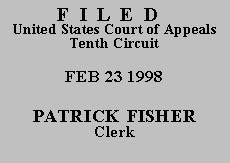

| WANDA JENKINS,
Plaintiff-Appellant, v. CITY OF TOPEKA and DOUGLAS S. REINERT, Defendants-Appellees. |
|
Alan G. Warner, Warner, Bixler & Associates, L.L.C., Topeka, Kansas, for Appellant.
Craig C. Blumreich, Gehrt & Roberts, Chartered, Topeka, Kansas, for Appellees.
Plaintiff filed this personal-injury action on April 12, 1996, long before the two-year statute of limitations was due to expire on September 8, 1996. See Kan. Stat. Ann. § 60-513(a)(4). See generally Cook v. G.D. Searle & Co., 759 F.2d 800, 802 (10th Cir. 1985) (following Guaranty Trust Co. v. York, 326 U.S. 99 (1945), to hold state statute of limitations governs in diversity suit). However, under Kansas law regarding the commencement of civil actions, plaintiff could rely on the filing date only if she served defendants within ninety days of filing; service thereafter would shift the commencement date ahead to the date of service. See Kan. Stat. Ann. § 60-203(a). See generally Walker v. Armco Steel Co., 446 U.S. 740, 751 (1980) (under York, state service rule, as integral part of limitations scheme, governs commencement for tolling purposes; under Hanna v. Plumer, 380 U.S. 460 (1965), Fed. R. Civ. P. 3 "governs the date from which various timing requirements of the Federal Rules begins, but does not affect state statutes of limitations."). In short, if plaintiff did not effect service by September 8, 1996, her action would be subject to dismissal as time-barred.
Plaintiff attempted to satisfy the service requirement by sending defendants a request for waiver of service pursuant to Fed. R. Civ. P. 4(d) shortly after filing her complaint. Defendants refused to sign and return the waiver of service. However, on May 9, 1996, their attorney filed with the court a formal "ENTRY OF APPEARANCE" under the caption of the case, representing that he "enters his appearance herein as counsel of record on behalf of the defendants in the above captioned action." Appendix of Appellant at 7.
Several weeks later, defendants filed an answer summarily asserting a number of affirmative defenses, including insufficiency of service and lack of personal jurisdiction. Thereafter, the case proceeded without incident through early discovery and scheduling. Then, on December 20, 1996, defendants moved to dismiss, contending they had not been served and could no longer be brought within the court's jurisdiction because the applicable statute of limitations had expired. The magistrate judge agreed and granted the motion.
II
It is important, for understanding the applicability and operation of the controlling law in this diversity action, to distinguish between two easily confused procedural concepts: effectuation of sufficient service and waiver of insufficient service. Effectuation of service is a precondition to suit, while waiver of insufficient service is the forfeiture of defense to that service.
The parties do not dispute that Kansas law governs the question of effectuation of service raised in this case. See, e.g., Walker, 446 U.S. at 751-53; see also Fed. R. Civ. P. 4(e). Under Kan. Stat. Ann. § 60-203(c), "[t]he filing of an entry of appearance shall have the same effect as service." See also Lindenman v. Umscheid, 875 P.2d 964, 978 (Kan. 1994). Thus, plaintiff argues that defendants' formal entry of appearance filed May 9, 1996, satisfied the service requirement, bringing them within the personal jurisdiction of the district court prior to any objection to service and long before the statute of limitations expired. See Dotson v. State Highway Comm'n, 426 P.2d 138, 143 (Kan. 1967) ("[Defendant's] execution and filing of written entry of appearance was equivalent to service of process (K.S.A. 60-203), and [defendant] thereby submitted himself to the court's jurisdiction.").
The magistrate judge denied § 60-203(c) its "literal reading" because he was concerned that even counsel who, mindful of § 60-203(c), does not file a separate entry of appearance and carefully asserts insufficient service as a defense by answer or pre-pleading motion, would still waive the defense through his "appearance" in the very act of asserting/preserving it. This concern is unwarranted. As the magistrate judge himself noted, Kansas law (echoing established federal waiver principles under Fed. R. Civ. P. 12) now clearly holds that the defense of insufficient service may be asserted, and thereby preserved, in a responsive pleading or motion. See Kan. Stat. Ann. § 60-212(b), (h); City of Hutchinson ex rel. Human Relations Comm'n v. Hutchinson, Kan. Office of State Employment Serv., 517 P.2d 117, 122-23 (Kan. 1973) (applying § 60-212 to reject waiver-by-responsive-pleading posited here).
In contrast, because filing an entry of appearance effects service under § 60-203(c), once counsel formally took such action on defendants' behalf prior to any responsive pleading, defendants could not thereafter contest the sufficiency of service by answer or motion--but this had nothing to do with defense preservation/waiver under Rule 12. A defense cannot be preserved or waived unless it exists, and, with service already accomplished under § 60-203(c), there was no insufficient-service defense to "preserve" when defendants responded to the complaint.
Accordingly, we hold that service of process was properly effected pursuant to § 60-203(c) on May 9, 1996, when counsel entered his appearance on defendants' behalf. As this resulted in commencement of the action well within the statute of limitations, dismissal for the reasons stated by the magistrate judge was erroneous. This holding obviates consideration of plaintiff's alternative contention that the magistrate judge erred in failing to afford her the chance to cure service retroactively under § 60-203(b).
The judgment of the United States District Court for the District of Kansas is REVERSED, and the cause is REMANDED for further proceedings consistent with this opinion.
1. The parties consented to disposition of the action by the magistrate judge pursuant to 28 U.S.C. § 636(c)(1). Accordingly, our appellate jurisdiction arises under § 636(c)(3) and 28 U.S.C. § 1291.